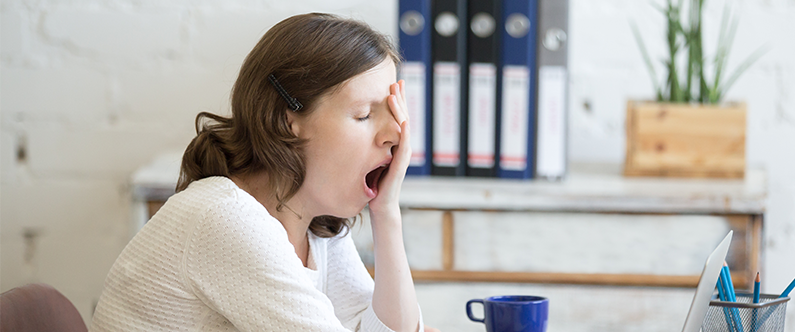Being sleep smart!
 It is highly recommended to seek help from a medical professional if there is difficulty with sleep for prolonged periods
It is highly recommended to seek help from a medical professional if there is difficulty with sleep for prolonged periods
Sleep is essential to maintain good physical and mental health. It is just as important as eating a nutritious diet and engaging in regular movement. Restorative sleep helps the body to repair, and keep us fit, alert, and in a good mood, thus improving overall productivity and quality of life.
Factors causing sleep disruption
It is common for us to experience sleep disturbance at some point in our lives. Several factors can contribute to sleep disruption. Some examples are listed below:
- Emotional factors like anxiety, stress or worry about money, work, and family
- Pain from a recent injury or medical condition
- Change from the usual routine due to travel or shift work
- The sleep environment is too noisy, bright, hot, or cold
Sleep disturbance may manifest as having difficulty falling asleep, disturbed sleep, daytime drowsiness, and overall inconsistency in sleep quality and duration.
Sleep hygiene and restorative sleep
Sleep hygiene consists of a variety of practices during the day and before bedtime which are necessary to have a high-quality night’s sleep. For sleep disturbance arising due to an injury or a medical condition, medical advice needs to be sought. Otherwise, for most people, the following good sleep hygiene tips should help achieve a restful night’s sleep.
1. Regular sleep schedule: Maintain regular waking and bedtime every day—even during weekends. This will help to set up the body’s internal clock. If you have not had a good night’s sleep, it is recommended to wake up the next morning around the usual time to heighten the “sleep drive”. This will help you sleep better the following night.
2. Reduce or avoid long naps: Power naps of less than 30 minutes during the day can lift mood and increase alertness; however, long naps will make it hard to sleep at night.
3. Exercise: Regular exercise during the daytime contributes to restful sleep, but vigorous exercise should be avoided 4 hours before going to bed as hormones released during vigorous exercise interfere with sleep. However, relaxing exercise such as yoga is recommended.
4. Limit or avoid stimulants: Substances like caffeine and nicotine before bedtime can interfere with sleep. So, avoid beverages like tea, coffee, cola, and energy drinks at least 4-6 hours before bedtime. Avoid using tobacco and alcohol too as they disrupt sleep in addition to having other harmful effects on health

5.
Eat right: Going to bed hungry or after a heavy meal can affect sleep. Spicy and deep-fried foods can trigger indigestion and hence disrupt sleep. Have an early and light dinner. If you feel hungry later at night, eat a light healthy snack or drink a glass of warm milk before going to bed.
6.
Unplug: It has been proven that screens and sleep are incompatible. The blue light from the screens interferes with the release of melatonin (a sleep-inducing hormone) and disrupts sleep. Turn on the blue-light filters and “night-time mode” on your devices or avoid using them before bedtime altogether. Use alarm clocks to wake you up in the mornings instead of using mobile phone alarms. Avoid browsing the internet and social media just before bedtime as this might keep you awake. Put mobile phones into “do not disturb mode” to avoid notifications and receiving calls.
7.
Pre-bedtime routine: Try relaxing activities, anything to help you unwind, like reading a book, listening to music, or meditation. Relaxing stretches or breathing exercises for 15 minutes before bedtime helps some people to sleep better. Sleepiness is associated with a drop in body temperature. Taking a hot shower 1-2 hours before bedtime will raise the body temperature causing you to feel drowsy when the body temperature drops.
8.
Quiet and comfortable space: Avoid exposure to bright light during bedtime. The artificial white light from the lamps etc. at night can interrupt the sleep-wake cycle, making it hard to fall asleep. So, try and dim the lights at home after dinner time. Wearing eye masks and having blackout curtains in the bedroom would also help to block out streetlights. Use earplugs if needed, to minimize noise as a quiet room is also important for good sleep.
9.
Right temperature: Studies have shown that the ideal room temperature to sleep is when it is cool at 15°C- 21°C. Set the room temperature to a cool setting and use comfortable bedding, which would allow you to relax and not make you too hot or cold.
10.
Learn how to handle sleeplessness: If you are having trouble sleeping after 20 minutes of staying in bed, get up and leave the room, and do relaxing things rather than interesting things. Frequently checking the clock is also discouraged as this instills negative thoughts and in turn affects sleep.
Everyone young and old needs to practice good sleep hygiene to remain alert during the daytime and to prevent the development of sleep disturbance. However, it is highly recommended to seek help from a medical professional if there is difficulty with sleep for prolonged periods.
Authors: Ms. Anupama Jithesh, Dr. Sohaila Cheema, Dr. Karima Chaabna, and Dr. Amit Abraham
Editor: Mr. John Hayward